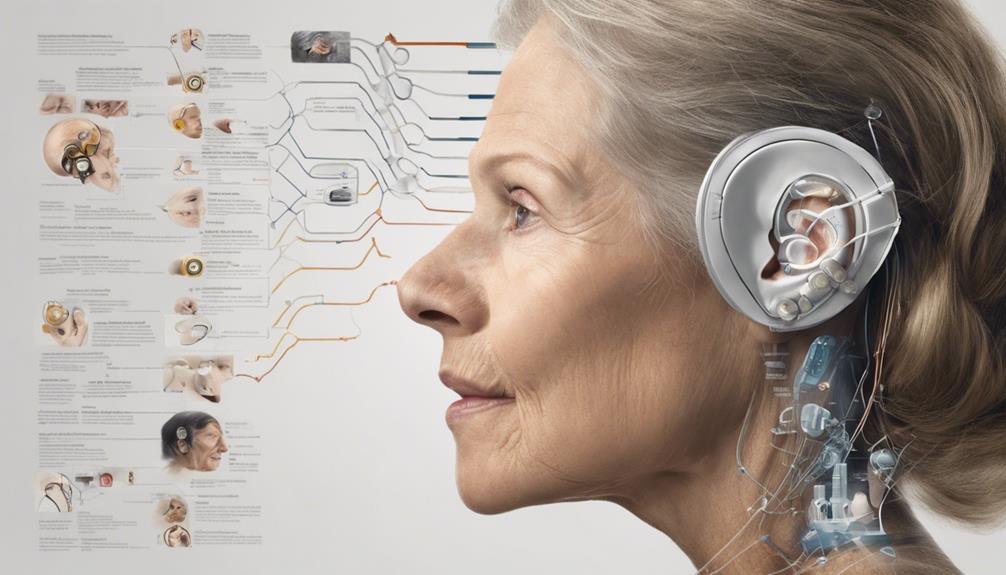Exploring the realm of cochlear implants often leads to a common question about how these remarkable devices improve hearing abilities.
Understanding the mechanics behind cochlear implants can provide valuable insights into their effectiveness and impact on individuals with hearing loss.
Curious to unveil the mysteries of this transformative technology?
Key Takeaways
- Cochlear implants convert sound waves to electrical impulses for individuals with severe hearing loss.
- Eligibility requires significant hearing loss in both ears and limited benefit from hearing aids.
- Financial aspects include costs ranging from $50,000 to $100,000 and varying insurance coverage.
- Maintenance involves regular care, avoiding water damage, and following the manufacturer's guidelines.
How Do Cochlear Implants Work?
Cochlear implants function by converting sound waves into electrical impulses that directly stimulate the hearing nerve. These innovative devices consist of both an external processor and an internal implant, working in tandem to transmit sound signals.
By bypassing damaged hair cells in the cochlea, the electrical signals directly stimulate the auditory nerve, allowing individuals to perceive a wide range of sounds, including speech and environmental noises. The brain interprets these electrical impulses as sound, enabling recipients to understand and engage with their acoustic environment.
This process is crucial for individuals with hearing loss, as it provides them with access to auditory information that would otherwise be inaccessible. In essence, cochlear implants serve as a bridge between the world of sound and individuals with hearing impairments, offering them the opportunity to reconnect with the sounds that enrich their lives.
Who Is a Candidate for Cochlear Implants?

Individuals who are candidates for cochlear implants typically exhibit severe to profound hearing loss in both ears. Cochlear implants are considered for those who've limited benefit from hearing aids and struggle with social interactions due to their hearing loss.
To determine candidacy for cochlear implants, a thorough evaluation by a cochlear implant team is necessary. Here are three key factors that are considered when evaluating candidates for Cochlear implants:
- Severity of hearing loss: Candidates must have severe to profound hearing loss in both ears, where hearing aids provide limited benefit.
- Health for Surgery: Good overall health is essential for undergoing cochlear implant surgery, as it's a surgical procedure that requires anesthesia.
- Commitment to Aftercare: Candidates must be willing to commit to aftercare, which includes regular programming sessions and auditory training to maximize the benefits of the cochlear implant.
Being a candidate for cochlear implants involves meeting specific criteria to ensure the best possible outcomes post-surgery.
What Is the Cost of Cochlear Implants?
Exploring the financial aspects of cochlear implants reveals a comprehensive range of costs that encompass surgery, the device itself, and the accompanying rehabilitation services. The cost of cochlear implants can range from $50,000 to $100,000. Insurance coverage for cochlear implants varies, with options like Medicare and many other plans covering the procedure for qualifying individuals.
Apart from the initial cost, additional expenses may include follow-up appointments, device maintenance, and accessories. It's crucial to check with your insurance provider to understand the specifics of coverage for cochlear implants.
Fortunately, there are financial assistance programs available to help offset some of the costs associated with cochlear implants. These programs can provide support in navigating the financial aspects of cochlear implantation, ensuring that individuals have access to the necessary resources for their hearing needs.
How to Care for Cochlear Implants?

Considering the importance of maintaining the optimal performance of cochlear implants, it's essential to establish a regular care routine to ensure longevity and effectiveness.
Here are three important aspects to consider when caring for your cochlear implants:
- Water-Resistant but Avoid Swimming and Bathing: While cochlear implants are water-resistant, they aren't suitable for swimming or bathing. Exposure to water in these activities can damage the internal components of the implant. It's crucial to protect the device from excessive moisture.
- Use Water Accessories for Protection: Manufacturers offer water accessories specifically designed to protect the speech processor from water damage. These accessories can help safeguard the delicate electronic components of the implant during activities where exposure to moisture is unavoidable.
- Regular Maintenance for Optimal Performance: Regular maintenance, including cleaning and checking for any signs of wear, is essential to ensure the optimal performance of your cochlear implant. By following the recommended maintenance schedule provided by the manufacturer, you can prolong the lifespan of your device and maintain its effectiveness in aiding your hearing.
Are Cochlear Implants Reversible?
When contemplating the permanence of cochlear implants, it's crucial to understand that these devices aren't reversible and necessitate a surgical procedure for implantation.
Cochlear implants use advanced technology to bypass damaged parts of the inner ear and directly stimulate the auditory nerve, enabling individuals with hearing loss to perceive sound.
Once surgically implanted, removing a cochlear implant isn't a straightforward process. It can potentially cause harm to the delicate inner ear structures and may not restore previous hearing levels if reversed.
Reversing the effects of a cochlear implant would require additional surgical intervention and careful consideration with input from medical professionals.
If a decision is made to remove a cochlear implant, the individual may experience a return to their pre-implant hearing status. Therefore, it's essential for individuals considering cochlear implants to thoroughly discuss the irreversible nature of these devices with their healthcare providers before undergoing the implantation procedure.
Frequently Asked Questions
What Are Arguments for Cochlear Implants?
Cochlear implants offer significant benefits over hearing aids for adults with severe to profound hearing loss. They enhance speech understanding, particularly in noisy environments, improving overall quality of life.
By providing access to various sounds, cochlear implants aid in social interactions. To achieve successful outcomes, commitment to aftercare and having realistic expectations are crucial.
These factors make cochlear implants a compelling option for individuals seeking improved communication abilities and better auditory experiences.
What Are 3 Risks Involved in Getting Cochlear Implants?
Getting cochlear implants involves some risks. Infection at the surgical site is quite rare but possible. There's a minimal risk of facial nerve damage affecting movement, and changes in taste sensation due to proximity to the chorda tympani nerve can occur.
While these risks exist, advances in technology and surgical techniques have significantly reduced their occurrence, enhancing the overall safety and effectiveness of cochlear implant procedures.
What Should I Know About Cochlear Implants?
When considering cochlear implants, it's important to know they're FDA-approved devices that can significantly improve speech perception and quality of life for individuals with severe to profound hearing loss.
These devices consist of an external processor and an internal implant that work together to stimulate the hearing nerve in the cochlea.
While not a cure for deafness, cochlear implants are effective communication tools that offer better speech understanding and communication than traditional hearing aids.
What Is the Controversy About Cochlear Implants?
The controversy surrounding cochlear implants arises from differing viewpoints within the Deaf community. Some argue that implants threaten cultural identity by promoting assimilation into the hearing world.
On the other hand, many believe implants offer a personal choice for enhancing quality of life for those with hearing loss. Despite research supporting early implantation in children for improved speech and language development, concerns persist regarding the impact on cultural identity versus medical intervention.
Conclusion
In conclusion, cochlear implants offer a life-changing solution for individuals with hearing loss. With their ability to convert sound waves into electrical impulses, these devices significantly enhance communication and speech comprehension.
As we navigate the world of advanced medical technology, let's remember that the power of sound is a gift worth cherishing. So, let's tune into the symphony of life with cochlear implants, unlocking a world of sound and connection.











